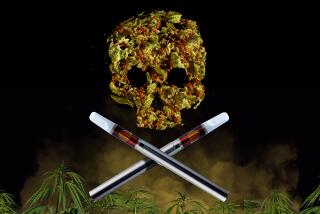Tobacco Pesticide Misused, Memos Opened at Trial Say
- Share via
LEXINGTON, Miss. — American Tobacco Co. continued spraying a suspected cancer-causing insecticide near cigarettes and cigarette filters for at least a year after learning that its products were being contaminated by excessive levels of the chemical, according to internal company memos disclosed in a trial here Wednesday.
The memos were introduced as evidence in a wrongful death suit against the company by survivors of the late Nathan H. Horton, who died from lung cancer last January. Horton, who was 50, smoked up to two packs a day of American’s Pall Mall brand for more than 30 years. Horton’s family, in a case widely considered to be the tobacco industry’s stiffest liability challenge ever, is charging that pesticides and additives in cigarettes contributed to the cancer.
Lawyers for the Horton family introduced an American Tobacco memo dated Jan. 6, 1976, stating that residues of the bug killer, known as DDVP, were present in cigarettes and filters at levels in some cases more than four times higher than the federal maximum for DDVP in food. There has been no established tolerance for the chemical in tobacco.
‘Not in Compliance’
The memo, written by A. F. Press Jr., whose title with the company was not given, recommended that DDVP spraying “be stopped wherever unprotected finished cigarettes and filter materials must be stored.”
A year later, another memo reported that American Tobacco still was “exposing unprotected finished cigarettes and little cigars as well as open bulks of tobacco and wrapping materials to DDVP Aerosols.”
The Jan. 20, 1977, memo written by company official T. P. Pettigrew said that the DDVP spraying “is not in compliance with . . . the EPA approved label for DDVP.” Specifically, wrote Pettigrew, the label said DDVP was “only for use in warehouse or factory area containing tobacco stored in hogsheads or cases.”
According to officials with the Environmental Protection Agency, it is illegal under federal pesticide safety law to disobey the directions on a pesticide’s agency-approved label. American Tobacco spokesmen, who previously have declined to comment on the trial, could not be reached.
In a videotaped deposition played for jurors Tuesday, Preston Leake, director of research and development for American Tobacco, said that following the 1977 memo, the company adjusted the pesticide spray nozzles, which greatly reduced DDVP residues in cigarettes.
More to Read
Inside the business of entertainment
The Wide Shot brings you news, analysis and insights on everything from streaming wars to production — and what it all means for the future.
You may occasionally receive promotional content from the Los Angeles Times.










